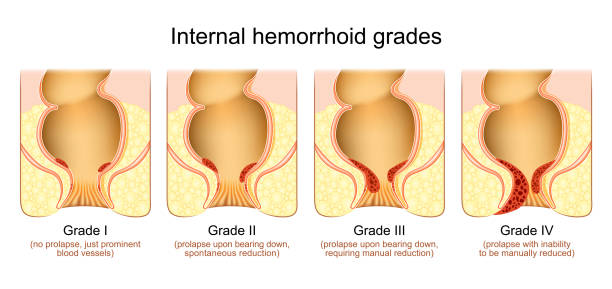Hemorrhoids are a common but uncomfortable reality. This blog post dives into how long hemorrhoids typically last, exploring factors affecting duration and offering strategies for treatment, prevention, and managing discomfort. Learn how to find relief and prevent future occurrences for a happier, healthier you.
Hemorrhoid Relief: How Long & What Works
The truth is, there's no one-size-fits-all answer to this question. The duration of hemorrhoids can vary greatly depending on several factors, including:
- Severity of Hemorrhoids: Hemorrhoids are classified into grades based on their location and protrusion. Grade 1 (internal hemorrhoids remain inside the rectum) typically cause less discomfort and might resolve quicker than Grade 4 (prolapsed hemorrhoids that protrude outside the anus).
- Contributing Factors: Underlying conditions like constipation, straining during bowel movements, or pregnancy can prolong the duration of hemorrhoids.
- Lifestyle Habits: Diet, exercise level, and overall well-being can influence the healing process.
Understanding the Duration: A Breakdown by Grade
Here's a breakdown of how long hemorrhoids might last depending on their severity:
- Grade 1 Hemorrhoids: Often the least bothersome and might go away on their own within a few days with home remedies like applying cold compresses and increasing fiber intake.
- Grade 2 Hemorrhoids: These can also resolve within a few days or weeks with home care, but might require additional measures like over-the-counter pain relief medications or sitz baths.
- Grade 3 Hemorrhoids: These hemorrhoids can protrude outside the anus but retract on their own. They may take several weeks to improve, and medical intervention might be necessary in some cases.
- Grade 4 Hemorrhoids: These hemorrhoids remain prolapsed outside the anus and require medical attention for treatment. They may not completely go away but can be managed to reduce discomfort.
The Importance of Early Intervention
Ignoring hemorrhoids can worsen their severity and prolong their duration. Here are some signs that indicate seeking medical attention is essential:
- Severe pain or bleeding
- Hemorrhoids that don't improve
- Prolapsed hemorrhoids that don't retract on their own
- Difficulties with bowel movements
A doctor can diagnose the type and severity of hemorrhoids and recommend the most appropriate treatment course. This might include:
- Lifestyle modifications: Dietary changes, increased fiber intake, and maintaining a healthy weight can contribute to healing and prevent recurrence.
- Medication: Medications like topical creams, ointments, or suppositories can relieve pain, itching, and inflammation.
- Minimally invasive procedures: Rubber band ligation is a common procedure for internal hemorrhoids, where a small band is placed around the base of the hemorrhoid to cut off blood supply and promote shrinkage.
- Surgery: In severe cases, surgery might be necessary to remove large or prolapsed hemorrhoids.
Preventing Hemorrhoids for Long-Term Relief
While hemorrhoids can be a frustrating experience, the good news is there are ways to prevent them from occurring or recurring in the future. Here are some key strategies to incorporate into your daily routine:
- High-Fiber Diet: Fiber adds bulk to stools, making them easier to pass and reducing straining. Aim for 25-35 grams of fiber daily from fruits, vegetables, and whole grains.
- Stay Hydrated: Drinking plenty of water throughout the day keeps stools soft and prevents constipation.
- Regular Exercise: Physical activity helps maintain bowel regularity and overall well-being. Aim for at least 30 minutes of moderate-intensity exercise most days of the week.
- Healthy Weight Management: Excess weight puts additional strain on the veins in the rectum and anus, increasing the risk of hemorrhoids.
- Maintain Proper Toilet Habits: Avoid straining during bowel movements. Take your time, and elevate your legs slightly with a stool to facilitate smoother elimination.
- Avoid Sitting for Long Periods: Sitting for extended durations can increase pressure on the veins around the rectum. Take regular breaks to get up and move around.
Living With Hemorrhoids: Managing Discomfort and Seeking Support
While hemorrhoids can be a temporary inconvenience for some, for others, they might become a chronic issue. Here are some tips for managing hemorrhoid discomfort and maintaining a good quality of life:
- Sitz Baths: Warm sitz baths can provide relief by relaxing the anal sphincter and reducing inflammation. Soak in warm water for 10-15 minutes several times a day.
- Over-the-counter pain relievers: Medications like acetaminophen or ibuprofen can help manage pain associated

